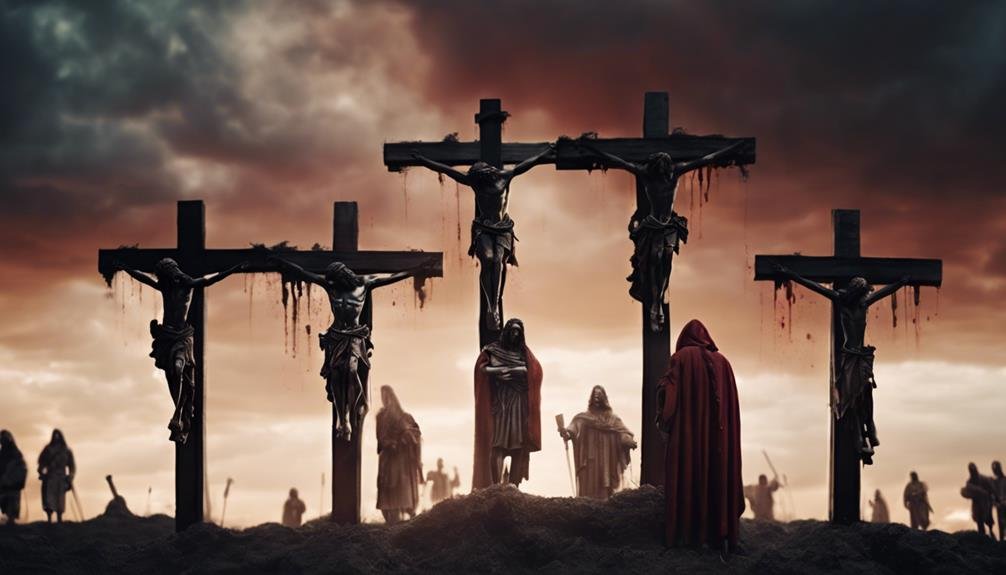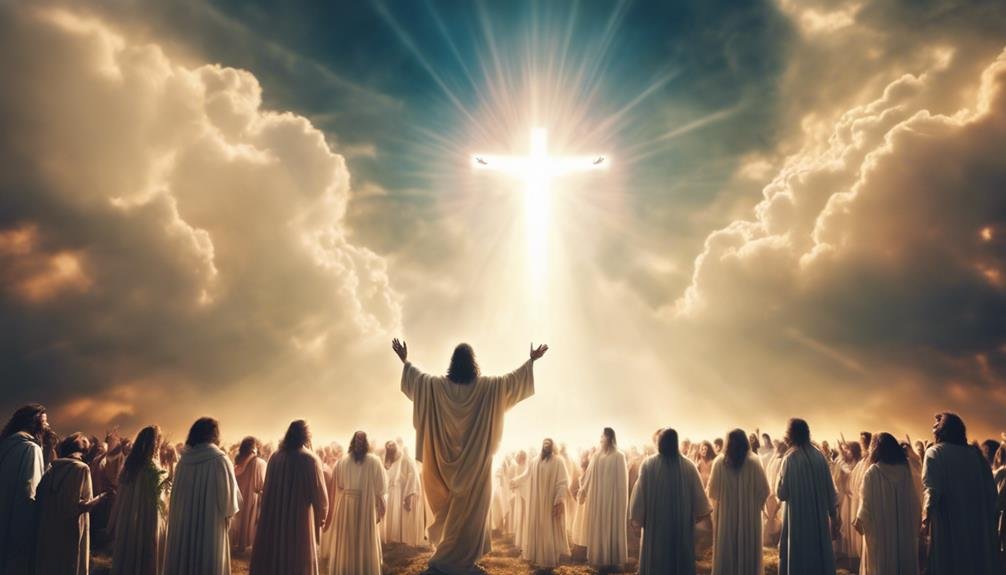You might wonder about the concept of Jesus dying a second time. It’s a curious topic that challenges the traditional Christian understanding of His life, death, and resurrection. While the crucifixion is well-documented as His first and only physical death, His resurrection and subsequent ascension into heaven raise questions about His ongoing existence and the nature of His eternal life. What if there’s more to the story than what’s commonly discussed? This intriguing question touches on theology, biblical accounts, and even misconceptions that have persisted over time.
Key Takeaways
- Jesus did not die a second time after His resurrection.
- The Ascension signifies Jesus’s return to Heaven, not a second death.
- The Second Coming involves Jesus’s return, not another crucifixion or death.
- Jesus’s resurrection and ascension highlight His eternal victory over death.
- Theological teachings affirm that Jesus’s death on the cross was a singular, sufficient sacrifice.
Crucifixion: The First Death

Jesus’s crucifixion marks the pivotal and key event of His death in Christian theology. As described in the New Scripture, Jesus, the Son of God, was crucified under Roman governance, an event that stands as a cornerstone of the Christian faith. According to scripture, His death wasn’t just a historical occurrence but a profound spiritual sacrifice intended to atone for the sins of humanity.
The New Scripture explicitly recounts His crucifixion, emphasizing its significance. There, Jesus endures immense suffering and ultimately surrenders His life, fulfilling prophecies and establishing a new covenant between God and humanity.
However, it’s important to understand that Jesus’s death on the cross is His only physical death. Following His resurrection, He didn’t die a second time as He ascended into heaven fully alive.
After His resurrection, Jesus spent forty days on Earth, appearing to His disciples and many others. These appearances confirmed His victory over death and reinforced His teachings. The notion of Jesus experiencing a second death isn’t found in Christian theology or scripture. Instead, His ascension signifies His eternal life and ongoing spiritual presence, solidifying His role as the eternal Son of God.
The Resurrection Event
The Resurrection Event marks a cornerstone of Christian belief, signifying Jesus’s triumph over death and His promise of eternal life. After Jesus was crucified and laid to rest, He rose from the dead three days later. This miraculous event is celebrated by Christians worldwide, underscoring the victory over death and the hope of salvation through Jesus.
Following His Resurrection, Jesus appeared to His disciples and various individuals to confirm His return to life. These appearances were pivotal, offering tangible proof to His followers that He’d indeed risen. By conquering death, Jesus demonstrated that God the Father had the power to grant eternal life, reinforcing the foundational Christian belief that death isn’t the end.
The significance of the Resurrection is profound, as it establishes Jesus’s divine nature and His role in salvation history. It’s a source of immense hope and joy for believers, affirming that through Jesus, they too can attain eternal life.
For more details or inquiries, feel free to reach out via email address provided in the article. Remember, all rights reserved.
This event remains distinct from His Ascension into Heaven, which took place later.
Significance of the Ascension

When considering the Ascension, you’ll see that it’s not a second death but a pivotal moment in fulfilling prophecy and establishing Jesus’s eternal leadership.
This event shows His return to the Father and underscores His ongoing reign in Heaven.
Understanding these points helps us grasp the profound significance of the Ascension in Christian theology.
Fulfillment of Prophecy
Frequently, the Ascension is seen as a profound moment that fulfilled ancient prophecies and signified the completion of Jesus’s earthly mission. Prophetic fulfillment was central to this event, as it was part of God’s divine plan. By ascending, Jesus met the Messianic promises and demonstrated a cosmic significance that resonated deeply with early Christians. Scriptural connections, such as those found in Psalms and Daniel, underscore this spiritual triumph, reinforcing that Jesus was indeed the promised Messiah.
To grasp the importance of the Ascension, consider the following elements:
| Element | Significance | Example in Scripture |
|---|---|---|
| Prophetic Fulfillment | Part of God’s divine plan | Acts 1:9-11 |
| Messianic Promises | Cosmic significance | Daniel 7:13-14 |
| Scriptural Connections | Spiritual triumph | Psalms 110:1 |
| Completion of Mission | Return to the Father | John 14:2-3 |
Through these lenses, the Ascension isn’t just a historical event but a pivotal moment that affirmed Jesus’s identity and mission. It connected various prophecies and promises, showcasing a seamless divine plan. This profound event marked not a second death but a spiritual elevation, emphasizing Jesus’s exalted position in Heaven.
Eternal Leadership Role
Recognizing the fulfillment of prophecy, you can now appreciate the significance of Jesus’s Ascension as His elevation to an eternal leadership role. This pivotal event marks not a change but a transition to a glorified state, underscoring His victory over sin and death.
By ascending to Heaven, Jesus assumes a position of eternal reign and heavenly authority over all creation. His divine leadership isn’t bound by earthly limitations but is everlasting and all-encompassing.
Consider these four key aspects to visualize the impact of Jesus’s Ascension:
- Eternal Reign: Jesus’s leadership extends beyond time, ensuring that His influence and authority are perpetual.
- Heavenly Authority: From His ascended position, Jesus governs with supreme power, guiding and protecting His followers.
- Divine Leadership: Jesus’s ascension solidifies His role as the ultimate leader, providing spiritual guidance and intercession for believers.
- Victory Over Sin and Death: The Ascension is a confirmation of Jesus’s triumph, offering hope and assurance of eternal life to His followers.
Understanding these elements helps you grasp the profound implications of the Ascension, emphasizing that Jesus’s leadership is both eternal and divine, heralding His promised return in glory.
Misconceptions Addressed
Many people mistakenly believe Jesus died a second time after His resurrection. However, this is a significant misconception. Jesus didn’t experience a second death; rather, He had an ascension. The Ascension is often misunderstood as another death, but it is important to recognize it as His departure from Earth to Heaven, fully alive.
| Misconception | Reality |
|---|---|
| Jesus died a second time | Jesus ascended, fully alive |
| The Ascension was a second crucifixion | The Ascension was a departure, not a death |
| The Second Coming involves another death | The Second Coming is His return, not His death |
The belief that Jesus died twice can also stem from confusing the Ascension with the crucifixion. But Jesus’s departure from Earth was an Ascension, not crucifixion. This distinction is vital to understanding the Christian faith accurately.
Additionally, the Catholic Mass honors Jesus’s sacrifice; it doesn’t suggest a re-crucifixion or a second death. There is no record in Christian teachings of Jesus dying a second time. By clearing up these misconceptions, you can better grasp the differences between misunderstood events and actual theological beliefs.
Theological Perspectives

You might wonder how different theological perspectives explain Jesus’s resurrection and ascension.
Some eschatological beliefs offer unique views on these events, while others provide symbolic interpretations.
Understanding these perspectives will help clarify why Jesus didn’t experience a second death.
Resurrection and Ascension
Theologically, Jesus’s resurrection and ascension mark pivotal events that underscore His triumph over death and His return to the divine domain. These moments highlight a profound spiritual transformation and divine return, where Jesus’s victory over death leads to His ascension into the heavenly sphere.
The resurrection event and the ascension significance are celebrated in the Christian faith as clear evidence of Jesus’s divine nature and His role in salvation history. You can visualize these events through the following sequence:
- Resurrection Event: Jesus rises from the dead, defeating death and proving His divine nature.
- Post-Resurrection Appearances: Over the next 40 days, Jesus appears to His disciples, teaching and preparing them for their mission.
- Ascension Significance: Jesus ascends into Heaven, marking His return to the Father and the completion of His earthly mission.
- Heavenly Sphere: Jesus sits at the right hand of God, interceding for humanity and preparing a place for believers.
These events are significant for understanding Christian theology, emphasizing that Jesus didn’t die a second time but instead ascended fully alive, ensuring His eternal presence in the heavenly sphere.
Eschatological Beliefs Variations
Diverse eschatological beliefs within Christianity grapple with the symbolic interpretations of Jesus’s return and the concept of a ‘second death.’ You’ll find that interpretive differences across denominations bring various theological implications to light.
Some theological perspectives argue that Jesus’s second coming symbolizes the ‘death’ of the old world order, paving the way for God’s eternal kingdom. This idea, however, is far from mainstream and is a more nuanced eschatological interpretation within Christian theology.
Eschatological perspectives often focus on judgment, renewal, and the establishment of God’s kingdom rather than a literal second death of Jesus. The notion of a second death is typically symbolic, representing the ultimate victory over sin and the final judgment. These doctrinal variations highlight the diverse beliefs that exist within the Christian community.
Symbolic representations of Jesus’s second coming can vary vastly, reflecting the rich tapestry of Christian thought. While not a central doctrine, the idea of Jesus dying a second time invites believers to explore deeper theological questions and to ponder the broader implications of eschatology.
Understanding these variations can deepen your appreciation for the complexity and diversity of Christian eschatological beliefs.
Symbolic Interpretations
In exploring symbolic interpretations of Jesus’s second coming, some theological perspectives suggest it represents the ultimate triumph over sin and the final establishment of God’s eternal kingdom. Rather than a literal second death, these interpretations focus on the spiritual significance and theological implications of His return.
Here’s what these symbolic interpretations might look like:
- Victory over Sin and Death: The second coming symbolizes Jesus’s final victory over all forms of sin and death, affirming His resurrection’s power and completeness.
- Restoration of Creation: This event marks the restoration of all things, where God’s original creation is renewed and brought to its intended glory.
- Judgment and Mercy: Jesus’s return emphasizes the balance of divine judgment and mercy, where justice is administered and believers receive eternal life.
- Eternal Kingdom: It signifies the full establishment of God’s eternal kingdom, where peace, righteousness, and divine fellowship prevail forever.
These symbolic interpretations enrich our understanding of the spiritual significance of Jesus’s second coming. They underscore the theological implications that His resurrection was a one-time, all-encompassing victory over death, negating the idea of a second death. This aligns with the foundational tenets of Christianity, emphasizing Jesus’s redemptive work and ongoing spiritual presence.
Biblical Accounts
Biblical accounts never mention Jesus dying a second time after His resurrection. According to Christian beliefs, after His resurrection, Jesus ascended into Heaven. This ascension is central to traditional Christian theology, which doesn’t include the notion of a second death for Jesus. Instead, the focus is on His victory over death, leading to eternal life.
In the Bible, Jesus’s resurrection and ascension are pivotal events. Christians look forward to the Second Coming, a prophesied event where Jesus will return. This event is closely tied to End Times, an eschatological belief concerning the final events of history. During these End Times, Judgment Day holds biblical significance as the moment when all souls are judged.
None of these events suggest a second death for Jesus. Instead, they emphasize His eternal life and role in divine judgment. The Bible consistently portrays Jesus’s resurrection as a singular, triumphant event. His ascension into Heaven marks the completion of His earthly mission, and His anticipated return signifies the fulfillment of God’s promises, not a repeat of His death.
Historical Context

Historical context provides essential insight into understanding why the idea of Jesus dying a second time never emerged in early Christian teachings. During the formative years of Christianity, the focus was on Jesus’s crucifixion, resurrection, and ascension. These events formed the bedrock of Christian beliefs, leaving little room for alternative narratives.
Several factors help illustrate this focus:
- Apocryphal texts and historical debates: While some non-canonical writings offer varied accounts of Jesus’s life, none suggest a second death. These texts were often scrutinized and debated but didn’t gain acceptance in mainstream Christianity.
- Mythical narratives and cultural interpretations: Early Christians aimed to distinguish their beliefs from surrounding pagan myths, which included gods experiencing multiple deaths and rebirths. This distinction reinforced the uniqueness of Jesus’s singular death and resurrection.
- Debate among scholars: Throughout history, theologians have debated many aspects of Jesus’s life and teachings. However, the idea of a second death never gained traction, as it conflicts with the theological implications of the resurrection and ascension.
- Theological implications: The concept of Jesus dying a second time contradicts foundational beliefs about salvation and redemption. It would undermine the significance of his resurrection, a cornerstone of Christian faith.
Comparative Religion Views
Religious traditions vary greatly in their interpretations of Jesus’s life, death, and what happened afterward. Christianity, Islam, and Judaism all offer distinct perspectives that shape their followers’ afterlife beliefs and eschatological views.
In Christianity, Jesus didn’t die a second time. Instead, He ascended into Heaven alive after His resurrection. This belief in the resurrection forms a cornerstone of Christian faith, emphasizing Jesus’s victory over death and His role in the second coming.
Islam, on the other hand, teaches that Jesus (known as Isa) never died on the cross but was taken up to Heaven by Allah. Muslims believe in Jesus’s future return, aligning with their messianic return and eschatological views. However, there’s no concept of Him dying a second time.
Judaism does not recognize Jesus as the Messiah, nor does it acknowledge His resurrection or any subsequent death. This creates a significant theological contrast with Christianity and Islam regarding Jesus’s role and destiny.
Here’s a comparative table summarizing these views:
| Religion | Afterlife Beliefs | Messianic Return & Eschatology |
|---|---|---|
| Christianity | Jesus ascended alive | Belief in second coming |
| Islam | Jesus taken to Heaven, no death | Future return of Jesus |
| Judaism | No recognition of resurrection | Jesus not seen as the Messiah |
Understanding these theological contrasts highlights the diversity in resurrection differences and messianic expectations across religions.
Impact on Christian Faith

Understanding these theological contrasts, you can see how the belief in Jesus’s resurrection profoundly shapes the core tenets of Christian faith. The absence of a second death for Jesus underscores His triumph over death and sin, which is fundamental to Christian teachings. This victory isn’t just a historical event but carries deep spiritual implications for believers.
Here are some key aspects to contemplate:
- Resurrection and Eternal Life: The resurrection signifies the promise of eternal life for Christians. By conquering death, Jesus assures believers of their own resurrection and eternal life.
- Second Coming: The belief in Jesus’s second coming carries significant implications. Christians hold that Jesus will return, not to die again, but to fulfill the promise of eternal salvation and establish God’s kingdom.
- Spiritual Implications: Jesus’s resurrection is a cornerstone of Christian faith, symbolizing hope and renewal. It reinforces the belief that through faith in Jesus, believers are spiritually reborn and cleansed from sin.
- Continued Presence: The ascension of Jesus into Heaven, rather than a second death, assures Christians of His continued presence and intercession on their behalf, reinforcing their faith and devotion.
These elements collectively shape the significance of Jesus’s resurrection in Christian belief.
Frequently Asked Questions
What Happened to Jesus the Second Time He Died?
You might be confused by resurrection theories, mystical accounts, or theological interpretations. Jesus didn’t die a second time; He ascended into Heaven alive 40 days after His resurrection. This marked His change to a glorified state.
When Did Jesus Die Second Time?
You won’t find historical records or theological debates supporting a second death for Jesus. Resurrection theories confirm He only died once and then ascended into Heaven alive, as affirmed by Christian teachings.
How Did Jesus Die the Last Time?
You might be confused; Jesus didn’t die a second time. His resurrection symbolism and ascension have significant theological implications, indicating His victory over death. Historically, this underscores His divine mission rather than suggesting multiple deaths.
What Happened When Jesus Fell the Second Time?
When Jesus fell the second time, the historical context highlights His immense physical suffering. Symbolic interpretations see it as representing human frailty. Theological implications emphasize Jesus’ unwavering commitment to sacrifice for humanity’s redemption.
Conclusion
In understanding Jesus’s death and resurrection, you see the cornerstone of Christian faith. His crucifixion, resurrection, and ascension signify His ultimate victory over death and sin.
There’s no second death; instead, His ascension marks His eternal reign in Heaven. This belief challenges misconceptions and underscores theological perspectives.
Embrace this profound truth: Jesus’s resurrection assures you of His everlasting power and presence, shaping the very foundation of your faith.

